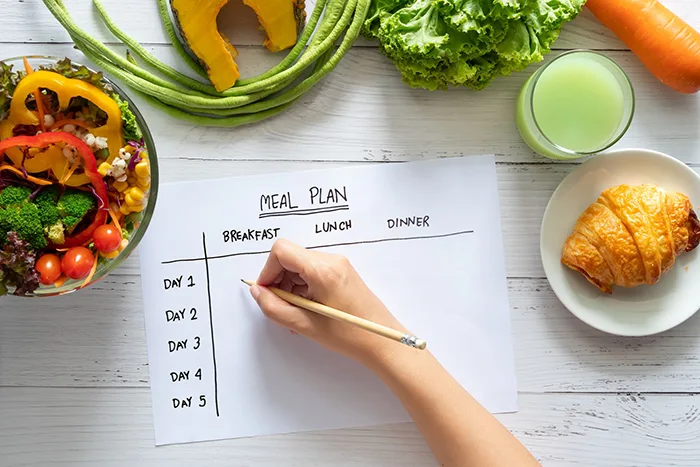Losing weight the healthy way is about more than just shedding pounds—it’s about creating lasting habits that nourish your body, boost your energy, and improve your overall well-being. If your goal is to lose 1 kg (about 2.2 pounds) a week, you’re aiming for a steady, sustainable pace that can have lasting benefits for both your physical and mental health. This is a realistic and achievable target for many individuals when paired with a combination of mindful eating, regular exercise, and positive lifestyle changes. In this comprehensive guide, we’ll break down the most effective, evidence-backed strategies to help you lose 1 kg a week and make lasting changes that you can maintain for the long haul.
How to Lose 1 kg a Week?
Understanding Weight Loss: Creating a Calorie Deficit
Before diving into specific strategies, it’s essential to understand the fundamental concept behind weight loss: calorie balance. To lose weight, you must create a calorie deficit, which means consuming fewer calories than your body needs to maintain its current weight.
To lose 1 kg of body weight, you need to burn approximately 7,000 calories more than you consume over the course of a week. That’s roughly a 1,000-calorie deficit per day. This doesn’t mean you need to starve yourself or deprive your body of nutrients. Instead, the goal is to reduce your calorie intake and increase your physical activity in a way that helps your body burn fat efficiently without feeling deprived.
Here’s how you can break this down into manageable steps.
How to Lose 1 Kg a Week: A Comprehensive, Sustainable Guide to Weight Loss
Losing weight the healthy way is about more than just shedding pounds—it’s about creating lasting habits that nourish your body, boost your energy, and improve your overall well-being. If your goal is to lose 1 kg (about 2.2 pounds) a week, you’re aiming for a steady, sustainable pace that can have lasting benefits for both your physical and mental health. This is a realistic and achievable target for many individuals when paired with a combination of mindful eating, regular exercise, and positive lifestyle changes. In this comprehensive guide, we’ll break down the most effective, evidence-backed strategies to help you lose 1 kg a week and make lasting changes that you can maintain for the long haul.
Understanding Weight Loss: Creating a Calorie Deficit
Before diving into specific strategies, it’s essential to understand the fundamental concept behind weight loss: calorie balance. To lose weight, you must create a calorie deficit, which means consuming fewer calories than your body needs to maintain its current weight.
To lose 1 kg of body weight, you need to burn approximately 7,000 calories more than you consume over the course of a week. That’s roughly a 1,000-calorie deficit per day. This doesn’t mean you need to starve yourself or deprive your body of nutrients. Instead, the goal is to reduce your calorie intake and increase your physical activity in a way that helps your body burn fat efficiently without feeling deprived.
Here’s how you can break this down into manageable steps.
Step 1: Calculate Your Caloric Needs
The first step to weight loss is to calculate your Basal Metabolic Rate (BMR) and Total Daily Energy Expenditure (TDEE). These numbers will help you understand how many calories your body needs to perform basic functions (like breathing and digestion) and how many calories you burn with activity throughout the day.
BMR (Basal Metabolic Rate):
This is the number of calories your body needs to perform its basic functions at rest (e.g., heartbeats, breathing, maintaining body temperature).
TDEE (Total Daily Energy Expenditure):
This is your BMR adjusted for your activity level. It accounts for all the calories burned through physical activity, work, and exercise.
Once you have your TDEE, aim to reduce your daily calorie intake by 500 to 1,000 calories to create the necessary deficit. Aiming for a 1 kg weight loss per week requires you to achieve a 1,000-calorie deficit per day. This is best done through a combination of reducing your calorie intake and increasing your physical activity.
Step 2: Adopt Healthy Eating Habits
The cornerstone of any successful weight loss plan is a well-balanced, nutrient-rich diet. Here’s how to make sure your eating habits are supporting your goal of losing 1 kg a week:
Mindful Eating:
- Listen to your body: Eat when you’re hungry, and stop when you’re satisfied. Avoid overeating by paying attention to portion sizes and hunger cues.
- Eat slowly: Take your time with meals to allow your body to register fullness. This can prevent overeating and help you feel more satisfied with less food.
- Limit distractions: Avoid eating in front of the TV or while distracted on your phone. Being mindful of what and how much you eat can help you stay on track.
Balanced Diet:
Incorporate a variety of nutrient-dense foods into your meals:
- Lean Proteins: Chicken, turkey, fish, eggs, legumes, and tofu. Protein helps build and repair muscle and promotes satiety.
- Whole Grains: Brown rice, quinoa, whole wheat pasta, and oats provide slow-digesting energy and fiber to keep you full.
- Fruits and Vegetables: Fill half your plate with colorful, fiber-rich fruits and veggies to keep your calorie intake low while still providing essential vitamins and minerals.
- Healthy Fats: Avocados, olive oil, nuts, and seeds can improve heart health and help you stay full.
Portion Control:
Portion sizes can often lead to overeating, even when eating healthy foods. Here are some tips:
- Use smaller plates to help control portions and avoid consuming excess calories.
- Serve yourself a smaller portion of higher-calorie foods like nuts, cheese, and oils to avoid eating too much.
- Pre-portion snacks in small containers to avoid mindlessly eating out of large bags or containers.
Limit Processed Foods and Sugars:
Cut back on sugary snacks, pastries, processed foods, and sugary drinks (including sodas, sugary coffees, and alcoholic beverages). These empty calories add up quickly and can derail your weight loss efforts.

Step 3: Incorporate Regular Exercise
Exercise plays a pivotal role in both burning calories and building muscle. Here’s how to incorporate effective workouts into your routine:
Aerobic Exercise:
To create a significant calorie deficit, aerobic activities are key. They help you burn calories efficiently and improve cardiovascular health. Aim for:
- Walking: Start with a brisk 30-minute walk every day to burn calories while keeping the impact on your joints low.
- Jogging or Running: If you’re more advanced, jogging or running for 30-45 minutes a few times a week will significantly boost calorie burn.
- Cycling: A fun and effective workout that engages your leg muscles while burning calories.
- Swimming: Full-body workout that burns a lot of calories and builds endurance.
Aim for 150 minutes of moderate-intensity aerobic exercise per week (or 75 minutes of vigorous activity) spread across the week. You can break this down into shorter sessions if needed.
Strength Training:
While aerobic exercise burns fat, strength training is essential for building lean muscle mass. Muscle burns more calories at rest, which helps you maintain a higher metabolism even when you’re not working out. Include strength training at least two times a week, targeting all major muscle groups.
- Bodyweight exercises: Squats, lunges, push-ups, and planks.
- Resistance training: Use weights, resistance bands, or machines to work your muscles.
- HIIT (High-Intensity Interval Training): Short bursts of intense activity followed by brief rest periods can burn fat effectively in less time.

Step 4: Hydration and Sleep for Weight Loss
Hydration:
Drinking enough water is essential for supporting your metabolism, suppressing hunger, and reducing cravings. Aim to drink at least 8 cups (2 liters) of water a day. Water also helps prevent overeating by making you feel full and is a great substitute for sugary, calorie-laden drinks.
Sleep:
Lack of sleep disrupts hormones that regulate hunger (ghrelin and leptin), leading to overeating and poor decision-making. Aim for 7-9 hours of quality sleep every night. Good sleep helps manage hunger and keeps your metabolism in balance, so don’t skimp on rest!
Step 5: Monitoring and Accountability
Track Your Food and Exercise:
Tracking your meals and workouts is a powerful tool to keep you accountable. Use a food diary or a weight loss app to log your meals, snacks, and workouts. This will help you stay on track with your calorie goals and identify areas for improvement.
Weigh-In Weekly:
Weigh yourself once a week at the same time and under the same conditions (e.g., in the morning, after using the bathroom). This helps you track your progress without getting discouraged by daily fluctuations in weight.
Step 6: Stress Management and Mental Wellness
Stress can significantly affect weight loss by increasing levels of cortisol, a hormone that promotes fat storage, especially in the abdominal area. Managing stress is crucial for weight loss and overall health:
- Practice mindfulness through meditation or deep breathing exercises.
- Incorporate yoga or stretching into your routine to relieve tension.
- Take time each day to unwind and prioritize activities that relax and rejuvenate you.
Sample Meal Plan for Losing 1 Kg a Week
Here’s an example of a balanced, calorie-conscious meal plan that aligns with your weight loss goals. Adjust the portions based on your specific calorie needs.
Breakfast:
- Scrambled eggs with spinach and cherry tomatoes
- 1 slice of whole-grain toast
- 1/2 cup of sliced strawberries
Lunch:
- Grilled chicken breast with a mixed green salad (lettuce, cucumber, bell peppers, and vinaigrette)
- A small apple
Snack:
- Greek yogurt with a handful of berries
Dinner:
- Baked salmon with steamed broccoli
- A small serving of quinoa
Snack:
- A handful of baby carrots with hummus

Conclusion: A Sustainable Approach to Losing 1 Kg a Week
Losing 1 kg a week is entirely possible with the right combination of healthy eating, exercise, hydration, and rest. By focusing on creating a sustainable calorie deficit, building muscle, and managing stress, you can achieve your weight loss goals and maintain them for the long term. Remember, slow and steady wins the race—weight loss isn’t about quick fixes, but rather about building habits that support long-term health and well-being.
Start small, stay consistent, and enjoy the process. You’ve got this!
Frequently Asked Questions (FAQ) on How to Lose 1 kg a Week.
1. Is it safe to Lose 1 kg a Week?
- Yes, losing 1 kg(about 2.2 pounds) in a week is generally considered a safe and sustainable rate of weight loss for most people. However, it’s essential to consult with a healthcare professional before starting any weight loss program to ensure it’s appropriate for your individual health circumstances.
2. What should I eat to lose weight at this rate?
- A balanced diet that includes lean proteins, whole grains, fruits, vegetables, and healthy fats is essential. Focus on portion control, avoid sugary and high-calorie foods, and prioritize nutrient-dense options.
3. How important is portion control when trying to lose weight?
- Portion control is crucial. Be mindful of serving sizes to prevent overeating and stay within your calorie goals. Smaller plates and utensils can help with portion control.
4. How often should I exercise to achieve this goal (lose 1 kg a week)?
- Aim for at least 150 minutes of moderate-intensity aerobic exercise per week, along with strength training exercises on two or more days. Consistency in your exercise routine is key.
5. Can I lose weight without exercising?
- While it’s possible to lose weight by solely adjusting your diet, incorporating regular exercise into your routine has many health benefits and can accelerate your weight loss efforts.
6. What if I’m not losing weight at the expected rate?
- Weight loss (lose 1 kg a week) can vary from person to person and week to week. Plateaus are normal. If you’re consistently not seeing results, consult with a healthcare professional or registered dietitian for guidance.
Related Posts:
Avoid These 12 Common Mistakes on Your Weight Loss Journey!




